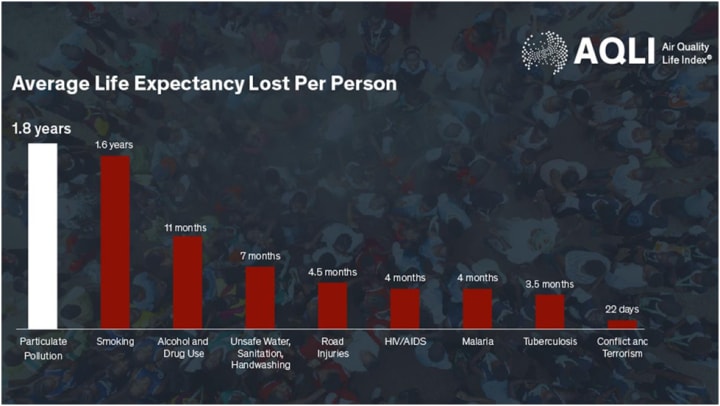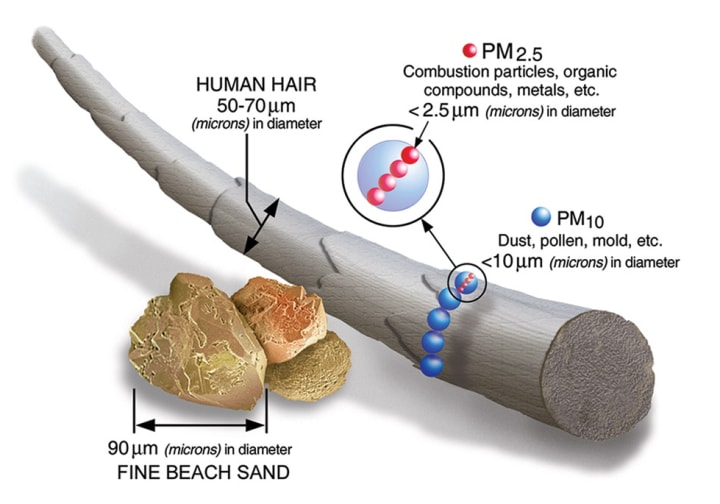Air pollution reduce life span by 5 years among South Asians!
In major cities in the world air pollution is a major cause of death. The National Institute of Environmental Health Sciences reported that air pollution, in all forms, is responsible for more than 6.5 million deaths each year globally and this number is all set to increase.

In a recent study by Energy Policy Institute at the University of Chicago it was found that particulate air pollution is the major cause of reduction of life expectancy, far exceeding malaria, tuberculosis and even deadly infection like the HIV/AIDS.
Fossil fuel driven air pollution cuts global average life expectancy by 1.8 years per person. [1] The director of EPIC, Michael Greenstone developed AQLI, an index that helps environmental scientists to study the results of air pollution and its effects on life expectancy; thus establishing a direct way of studying its effects on human population.
The National Institute of Environmental Health Sciences reported that air pollution, in all forms, is responsible for more than 6.5 million deaths each year globally and this number is all set to increase, especially in the urban areas.

Major pollutant:
Ozone, atmospheric gas, results in smog at the ground level. It is mainly emitted by cars, power plants and other industries.
Noxious gases, include the oxides of nitrogen, oxides of sulfur, oxides of carbon.
Particulate matter (PM) is composed of chemicals such as sulfates, nitrates, carbon etc. A subset of PM known as PM 2.5 is 30 times thinner than hair as a result can be inhaled and result in disruption and inflammation of the alveoli of the lungs.

Volatile organic compounds (VOC), carbon containing compounds which volatize easily are called VOC. They are present in gasoline, paints, pesticides, etc.
Polycyclic aromatic hydrocarbons (PAH) are organic compounds which are hydrocarbon derivates. They are widely used in industries and some of them are considered carcinogenic.
Diseases caused by air pollution:
Cancer, research shows that lung cancer and breast cancer are the common cancer types seen commonly in the patients. Occupational exposure to benzene and gasoline cause leukemia and non-Hodgkin’s Lymphoma.
Cardiovascular disease, particulate matter can impair blood vessel function and result in rapid calcification in arteries. In some adult Americans, research shows that TRAP (Traffic Related Air problem) results in reduction of high density lipoprotein, resulting in cardiovascular damage.
Respiratory diseases are a direct result of air pollution. Emphysema, asthma and other respiratory diseases such as COPD are becoming increasingly common in the urban areas.
Children, pregnant woman and older adults are the primary group who are directly affected by such air pollution borne diseases. Research shows that parental exposure to TRAP are directly affected with ADHD, lower brain development and even autism in the newborns, thus increasing the reason why air pollution and its ill effects should be checked on the population.
The report[3] of the “Planetary Health” by “The Lancet” pointed out that in the past 20 years deaths from the modern forms of pollution have gone up substantially. Modern forms of pollution include ambient particulate matter air pollution, ambient ozone pollution, lead exposure, carcinogen, etc. The rise of such forms of pollution coupled with an ageing population resulted in a substantial increase in the deaths in the South and South-East Asia.
Thirty six percent of our population lives in China and India, the 2 most populous countries in the world. The study by professor Greenstone of EPIC shows that WHO guidelines are not met in these countries, which result in 36% of the world population result in the loss of 73% of all the years lost due to particulate pollution. Thus an average Indian would live 4.5 years longer, changing the average life expectancy from 69 to 73 years.
References and further reading:
1. “Air pollution reduces global life expectancy by nearly two years” – Uchicago news (viewed on date 08th April 2024) https://news.uchicago.edu/story/air-pollution-reduces-global-life-ex
2. “Air pollution and Your Health” – website “National Institute of Environmental Health Sciences” ( viewed on 08th April 2024). https://www.niehs.nih.gov/health/topics/agents/air-pollution
3. Fuller R , Landrigan P, Balakrishnan K, Bathan G, Pollution and health : a progress update, Review volume 6, Issue 6, E535-E547, June 2022 https://www.thelancet.com/journals/lanplh/article/PIIS2542-5196(22)00090-
About the Creator
Mind Mastery
Hello there,
This page contains content on science based tools that increases health, focus and efficiency which in turn increases productivity at work thus create a correct balance of mind and body leading to mind mastery.
Happy reading






Comments (1)
wow! great job